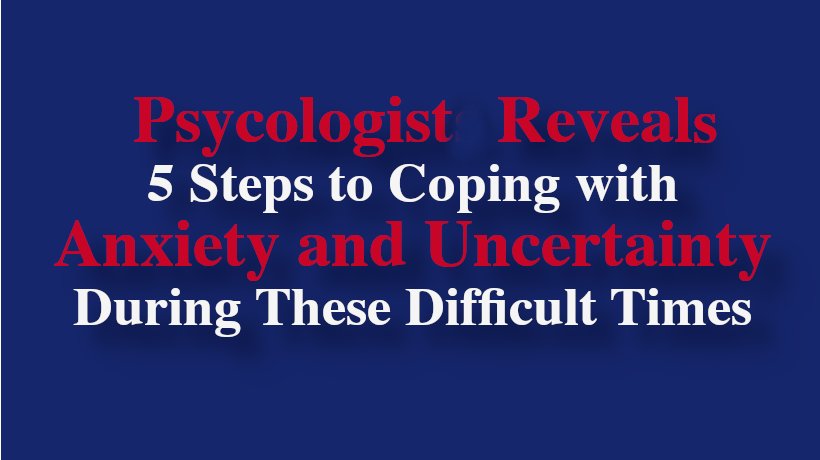The current health crisis has changed the way many of us are used to living. This has inevitably left us with a lot of uncertainty about what we will be doing in the next few months, weeks or even days. Trying to figure out answers to questions we don’t have the answers to while avoiding thoughts of scary possibilities can feel debilitating and leave us anxious. Clinical Psychologist, Inna Khazan, Ph.D., says that if this is how you are feeling know that you are not alone and there are steps you can take to cope with uncertainty in your life.
Khazan recommends this step-by-step approach to use when you experience uncertainty, using the acronym FLARE:
- Feel refers to recognizing the uncomfortable feeling that overcomes you when you notice yourself searching the internet for too long, or not being able to stop going through what-if scenarios. Khazan says, “You might feel the tension in your chest or shoulders, the heaviness in your head, discomfort in your stomach, or shortness of breath.”
- Label is there to remind you to tell yourself that this experience is “uncertainty” or “unhelpful thinking.” Khazan explains that when you feel anxious, the fear center of your brain gets activated and the parts of your prefrontal cortex become less active. This pattern leads to unhelpful automatic responses to uncertainty and anxiety. By labeling your experience you can reverse this pattern—activating the parts of your brain that are most useful in responding to difficult feelings.
- Allow yourself to experience uncertainty. Khazan says, “You will end up wasting valuable time, energy, and resources on futile efforts to get rid of it.” Tell yourself that it is okay and normal to feel this way.
- Respond to the uncertainty in ways that allow you to separate your mind from the unhelpful thinking without trying to ignore it. Dr. Khazan recommends responding to your what-ifs with “I don’t know.” This allows you to disengage with trying to produce an answer. If you are feeling light-headed make sure to take some slow and deep breaths, allowing the discomfort you are experiencing to ease. Most importantly, be kind to yourself and know that you deserve peace and contentment.
- Expand your awareness. Dr. Khazan says to take in the sights and the sounds around you—the sky above your head, the floor under your feet, the person you see in front of you. This can allow you to see uncertainty as a part of your experience and reduce discomfort.
Dr. Khazan says in regard to thinking through every scenario, “Attempts to do that drain you of time, energy, and resources, and don’t leave enough to respond adaptively and resiliently to real-time changes in circumstances, usually ones you have not thought of or could have predicted.”
Instead, she recommends putting in the effort to create a flexible plan that focuses on what is reasonably under your control. For example, with the current health crisis, it can be helpful to have a plan that is consistent with the CDC guidelines for how to reduce the risk for yourself and what to do if you fall ill. “On the other hand, it is not helpful to try to figure out whether and by how much the official statistics are inaccurate, who in your neighborhood may have been exposed, or whether this virus is still going to be around in six months.”
Sources:



